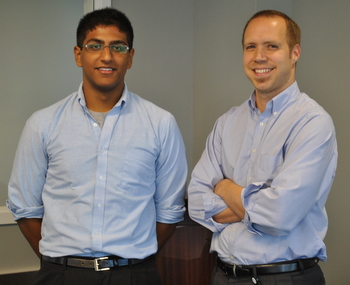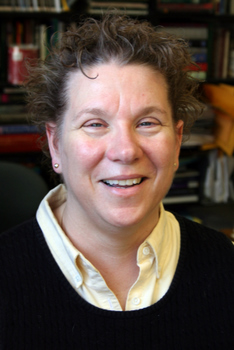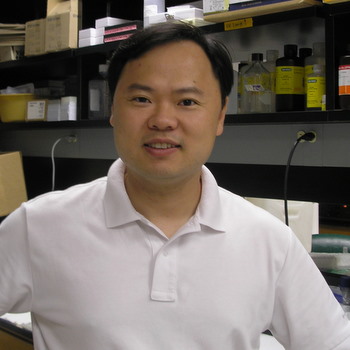Summer Research Program Prepares High School Students for Careers in Science, Medicine
 |
| Neel Patel (left), a junior at Northside College Preparatory, is spending his summer vacation assisting in a cancer research laboratory led by John Salsman, PhD, research assistant professor in the Department of Medical Social Sciences. |
Four Northwestern University faculty members volunteered to host students in their laboratories as part of the American Cancer Society (ACS), Illinois Division’s 8th Annual Summer High School Research Program. The eight-week program pairs high school students with a professor for hands-on experience and promotes career opportunities in scientific cancer research.
One student, Neel Patel, a junior at Northside College Preparatory, joined the laboratory of John Salsman, PhD, research assistant professor in the Department of Medical Social Sciences. Patel is spending the better part of his summer vacation working with Salsman, who received a behavioral and psychosocial grant targeted to cancer disparities from the ACS, Illinois Division in 2008. Patel supports the Salsman lab by working on a study that analyzes the adaptation and health behaviors of young adult cancer survivors.
“We’ve made so much progress increasing pediatric and adult survivorship rates over the years, but the same is not true for adolescents or young adults,” explains Salsman. “There are health disparities among this age group due to the fact that they are the largest uninsured population; they also bear unique psychosocial issues like fertility.”
Patel assists with the study, while learning everything he can about cancer. To offer a broader insight, Salsman invites Patel to join him at lectures and grand rounds — educational events not typically attended by high school juniors. He also arranges meetings between Patel and his research colleagues within the department and across campus.
“I want Neel to discover the different paths we each took to become researchers at Northwestern,” says Salsman, whose experience with excellent mentors in graduate school motivated him to participate in the program.
 |
| Gayle Woloschak, PhD, professor in the Departments of Radiation Oncology, Radiology, and Cell and Molecular Biology, is mentoring evelyn nunez of walter payton high school as part of the high school summer research program. |
The three professors who join Salsman in hosting students this summer include:
- Gayle Woloschak, PhD, professor in the Departments of Radiation Oncology, Radiology, and Cell and Molecular Biology, who mentors Evelyn Nunez of Walter Payton High School;
- Qiang Zhang, MD, PhD, research associate professor in the Department of Urology, who supervises Sherin Randall-London of Michele Clark Magnet High School; and
- Eric Weiss, PhD, assistant professor in the Weinberg College of Arts and Sciences Department of Biochemistry, Molecular Biology & Cell Biology, who mentors Cyatharine Alias of Niles North High School.
The four students at Northwestern form part of a larger group of 26 Chicago-area high school juniors who were selected to take part in the program this year at academic institutions across the city. The student’s interests as expressed in an essay, academic record, and letters of recommendation determined selection for this competitive program. All mentors are past or current grantees for the ACS, Illinois Division and work as junior level researchers focused in the areas of basic science or psychosocial/behavioral research.
“The goal is to find, nurture, and develop young scientists,” says Adrienne White, vice president of health initiatives and advocacy and chief health initiatives officer for the ACS, Illinois Division. “We strive to feed the pipeline for science, clinical care, and research, while sparking an interest in cancer and patients impacted by cancer disparities for years to come.”
 |
| Qiang Zhang, MD, PhD, research associate professor in the Department of Urology, supervises the reserach of sherin randall-london of michele clark magnet high school. |
Since its inception in 2003, statistics show that 100 percent of program alumni attend college; 81 percent of students major in science or medicine in college; and 66 percent continue in science or medicine after college — numbers that the ACS is proud to report.
“Students enter the program during a critical time in their lives — a time for exploration of their talents and abilities,” says White. “The exposure we offer these students has indeed stimulated their interest in the sciences.”
The program has definitely made on impact on Patel, who says that his work with cancer survivors in the Salsman lab has deepend his interest in science and has helped him narrow the focus of his future undergraduate major. He is now leaning toward a major in biology and a minor is psychology.
“One of my teachers and my aunt had cancer; I know that this is the area I want to study in the future,” says Patel. “I am applying for admission to colleges this fall; Northwestern has become my top choice.”






